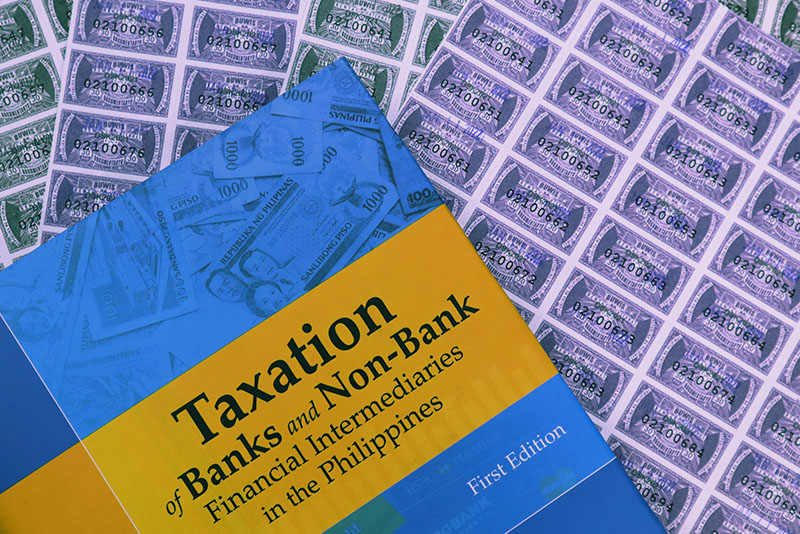
What We Would Miss if PIFITA is Not Passed
By: Atty. Donato U. Vergara, III
The administration’s Comprehensive Tax Reform Program (“CTRP”) is partially completed, thanks to the passage of the TRAIN Law and the CREATE Act. Yet, parts of this CTRP have not yet been enacted into laws, and their fates remain uncertain as the remaining sessions of the 18th Congress are dwindling.
 One of the remaining packages in the CTRP is the Passive Income and Financial Intermediary Taxation Act (“PIFITA”). The proposed law seeks to reform the taxation of capital income and financial services in the country, by redesigning the financial sector taxation into simpler, fairer and more efficient tax system. Some of its proposed changes were already adopted by TRAIN Law and the CREATE Act. But the other provisions on capital income and financial intermediation remain unchanged.
One of the remaining packages in the CTRP is the Passive Income and Financial Intermediary Taxation Act (“PIFITA”). The proposed law seeks to reform the taxation of capital income and financial services in the country, by redesigning the financial sector taxation into simpler, fairer and more efficient tax system. Some of its proposed changes were already adopted by TRAIN Law and the CREATE Act. But the other provisions on capital income and financial intermediation remain unchanged.
And we will not realize a lot of these proposed reforms on the taxation of the financial sector if the bill is not passed. The first one is on the opportunity to simplify a very complicated tax structure. The current structure presents numerous tax base and tax rate combinations on financial income, financial intermediation services and financial transactions. The tax on income depends on so many factors and conditions, including the term of the instrument, the issuer, the currency involved and residency of the income recipient. Similarly, the stamp taxes vary depending on the instruments or transactions involved, the terms, the issuers, among other factors. All these result in the variations in the tax base and tax rates, even among comparable financial instruments and transactions.
Also, the law would have minimized the practice of relying on the tax treatment as basis for making investment decision. Variations in tax treatment among sectors, or between financial institutions and non-financial institutions offering the same service and/or product, or between interests and dividends open the windows for arbitrage and leveraging. These disparities in tax treatment distort investment decisions considering that tax impositions overshadow all other considerations. The reform in the taxation of the financial system could help fuel and direct the movement of capital rightly to where they are most needed, and not dictated by taxation.
"Non-passage of the law also misses the opportunity to level the playing field. Our present system provides concessions or different tax treatments for certain transactions for some types of financial institutions compared to similar transactions of other financial institutions. There are exemptions, for example, which are enjoyed when issued by certain financial institutions but the same exemptions are not enjoyed when issued by other types of institutions. Also, the classifications among different financial institutions cause unequal treatment, for example, in the imposable business taxes where some are subject to the gross receipts tax, others are subject to the premium tax, and others to the value-added tax. These differences in business tax types have also varying impacts to the institutions and their respective clients/investors."
The passage of the law would have also corrected the inequitable distribution of tax burden. Investments in equity and some forms of long-term instruments attract lesser taxes. Hence, those who have more money to place in this kind of investment tend to pay lesser taxes compared to working class individuals who are content with placing their funds in short-term investments with higher taxes.
The non-enactment of the law also misses the opportunity to place the country at par with our neighbors in terms of competitive advantage. A comparison of the different taxes on capital income imposed by our neighbors shows that the Philippine tax on capital income remains the highest in the region. Considering this, the Philippine capital market remains uncompetitive and continues to lag behind our neighbors.
And of course, putting in the reforms proposed under PIFITA will reduce costs from an administration and compliance perspective. Lesser costs translate to higher taxes.
A number of reforms in our financial frameworks are already in place, with the common aim of expanding the capital market and building up financial capacity. Sadly, in so far as the areas of taxation of the capital market and financial services are concerned, no serious reform had been pursued much less a comprehensive one. The inclusion of the capital income and financial services in the CTRP saw an opportunity to achieve the must needed reform in this area. I fully subscribe to the proposal that this reform should be pursued to its final conclusion.
The author is a senior associate of Du-Baladad and Associates Law Offices (BDB Law), a member-firm of WTS Global.
The article is for general information only and is not intended, nor should be construed as a substitute for tax, legal or financial advice on any specific matter. Applicability of this article to any actual or particular tax or legal issue should be supported therefore by a professional study or advice. If you have any comments or questions concerning the article, you may e-mail the author at This email address is being protected from spambots. You need JavaScript enabled to view it. or call 8403-2001 local 320.




